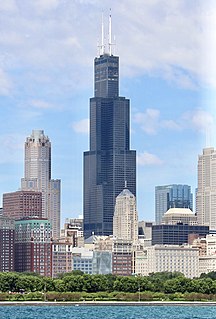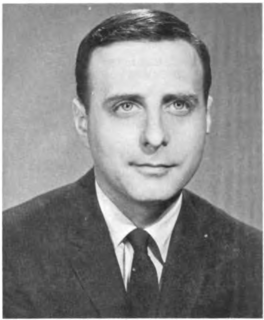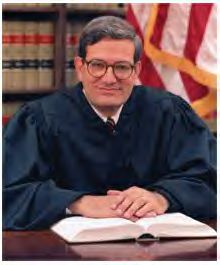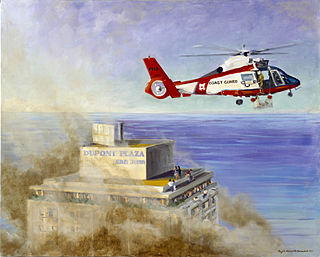
The Racketeer Influenced and Corrupt Organizations (RICO) Act is a United States federal law that provides for extended criminal penalties and a civil cause of action for acts performed as part of an ongoing criminal organization.

The Willis Tower is a 108-story, 1,451-foot (442.3 m) skyscraper in the Loop community area of Chicago in Illinois, United States. Designed by architect Bruce Graham and engineer Fazlur Rahman Khan of Skidmore, Owings & Merrill (SOM), it was completed in 1974 as the world's tallest building, a title that it held for nearly 25 years. It is currently the third-tallest building in the Western Hemisphere, as well as the 23rd-tallest in the world. Each year, more than one million people visit the Skydeck observation deck, the highest in the United States, making it one of Chicago's most popular tourist destinations.
A lawsuit is a proceeding by a party or parties against another in the civil court of law. The archaic term "suit in law" is found in only a small number of laws still in effect today. The term "lawsuit" is used in reference to a civil action brought by a plaintiff demands a legal or equitable remedy from a court. The defendant is required to respond to the plaintiff's complaint. If the plaintiff is successful, judgment is in the plaintiff's favor, and a variety of court orders may be issued to enforce a right, award damages, or impose a temporary or permanent injunction to prevent an act or compel an act. A declaratory judgment may be issued to prevent future legal disputes.

Sears, Roebuck and Co., commonly known as Sears, is an American chain of department stores founded in 1892 by Richard Warren Sears and Alvah Curtis Roebuck and reincorporated in 1906 by Richard Sears and Julius Rosenwald. What began as a mail ordering catalog company migrated to opening retail locations in 1925, the first in Chicago. In 2005, the company was bought by the management of the American big box discount chain Kmart, which upon completion of the merger, formed Sears Holdings. Through the 1980s, Sears was the largest retailer in the United States. In 2018, it was the 31st-largest. After several years of declining sales, Sears's parent company filed for Chapter 11 bankruptcy on October 15, 2018. It announced on January 16, 2019, that it had won its bankruptcy auction, and that a reduced number of 425 stores would remain open, including 223 Sears stores.
Zenith Electronics, LLC, is an American research and development company that develops ATSC and digital rights management technologies. It is owned by the South Korean company LG Electronics. Zenith was previously an American brand of consumer electronics, a manufacturer of radio and television receivers and other consumer electronics, and was headquartered in Glenview, Illinois. After a series of layoffs, the consolidated headquarters moved to Lincolnshire, Illinois. For many years, their famous slogan was "The quality goes in before the name goes on". LG Electronics acquired a controlling share of Zenith in 1995; Zenith became a wholly owned subsidiary in 1999. Zenith was the inventor of subscription television and the modern remote control, and was the first to develop high-definition television (HDTV) in North America.

Richard Warren Sears was an American manager, businessman and the founder of Sears, Roebuck and Company with his partner Alvah Curtis Roebuck.

Edward Roy Becker was a United States Circuit Judge of the United States Court of Appeals for the Third Circuit and a United States District Judge of the United States District Court for the Eastern District of Pennsylvania.

José Alberto Cabranes is a United States circuit judge of the United States Court of Appeals for the Second Circuit and a former presiding judge of the United States Foreign Intelligence Surveillance Court of Review ("FISCR"). Formerly a practicing lawyer, government official, and law teacher, he was the first Puerto Rican appointed to a federal judgeship in the continental United States (1979).
Robert A. Clifford (1950/1951) is a Chicago trial lawyer and principal partner at Clifford Law Offices. Clifford's firm specializes in "personal injury, medical malpractice, mass torts, consumer and health care fraud, product liability, and aviation and transportation disasters." He attended DePaul University for both his undergraduate work and Juris Doctor, finishing in 1976. The firm was founded in 1984 to represent plaintiffs in personal injury and wrongful death cases.

The Dupont Plaza Hotel arson was a fire that occurred at the Hotel Dupont Plaza in San Juan, Puerto Rico, on New Year's Eve, December 31, 1986.

Saul Ewing Arnstein & Lehr, LLP is a U.S.-based law firm with 16 offices and approximately 400 attorneys providing a broad range of legal services. Its offices are located along the East Coast from Boston to Miami and extend into the Midwest by way of Chicago. On September 1, 2017 Saul Ewing, LLP and Arnstein & Lehr, LLP merged to form Saul Ewing Arnstein & Lehr, LLP.
American Electric Power Company v. Connecticut, 564 U.S. 410 (2011), was a United States Supreme Court case in which the Court, in an 8–0 decision, held that corporations cannot be sued for greenhouse gas emissions (GHGs) under federal common law, primarily because the Clean Air Act (CAA) delegates the management of carbon dioxide and other GHG emissions to the Environmental Protection Agency (EPA). Brought to court in July 2004 in the Southern District of New York, this was the first global warming case based on a public nuisance claim.
Fellows v. Blacksmith, 60 U.S. 366 (1857), is a United States Supreme Court decision involving Native American law. John Blacksmith, a Tonawanda Seneca, sued agents of the Ogden Land Company for common law claims of trespass, assault, and battery after he was forcibly evicted from his sawmill by the Company's agents. The Court affirmed a judgement in Blacksmith's favor, notwithstanding the fact that the Seneca had executed an Indian removal treaty and the Company held the exclusive right to purchase to the land by virtue of an interstate compact ratified by Congress.

Obsidian Finance Group, LLC v. Cox is a 2011 case from the United States District Court for the District of Oregon concerning online defamation. Plaintiffs Obsidian Finance Group and its co-founder Kevin Padrick sued Crystal Cox for maintaining several blogs that accused Obsidian and Padrick of corrupt and fraudulent conduct. The court dismissed most of Cox's blog posts as opinion, but found one single post to be more factual in its assertions and therefore defamatory. For that post, the court awarded the plaintiffs $2.5 million in damages. This case is notable for the court's ruling that Cox, as an internet blogger, was not a journalist and was thus not protected by Oregon's media shield laws, although the court later clarified that its ruling did not categorically exclude blogs from being considered media and indicated that its decision was based in part upon Cox offering to remove negative posts for a $2,500 fee. In January 2014 the Ninth Circuit Court affirmed in part and reversed in part the district court's judgment awarding compensatory damages to the bankruptcy trustee. It also ordered a new trial on the blog post at issue.

Woollard v. Sheridan, 863 F. Supp. 2d 462, reversed sub. nom., Woollard v Gallagher, 712 F.3d 865, was a civil lawsuit brought on behalf of Raymond Woollard, a resident of the State of Maryland, by the Second Amendment Foundation against Terrence Sheridan, Secretary of the Maryland State Police, and members of the Maryland Handgun Permit Review Board. Plaintiffs allege that the Defendants' refusal to grant a concealed carry permit renewal to Mr. Woollard on the basis that he "...ha[d] not demonstrated a good and substantial reason to wear, carry or transport a handgun as a reasonable precaution against apprehended danger in the State of Maryland" was a violation of Mr. Woollard's rights under the Second and Fourteenth Amendments, and therefore unconstitutional. The trial court found in favor of Mr. Woollard, However, the Fourth Circuit Court of Appeals reversed the trial court and the U.S. Supreme Court declined to review that decision.
Albert Henry Loeb was a Chicago attorney and the former vice president and treasurer of Sears, Roebuck and Co. Loeb was the brother of Jacob Loeb, the former president of the Chicago Board of Education and was also the father of convicted murderer Richard Albert Loeb of the infamous Leopold and Loeb.

Aaron E. Nusbaum, later Aaron Norman, was an American entrepreneur and philanthropist who is best known as one of the two men who acquired 50% of the stock in the fledgling Sears, Roebuck and Co. from Richard Sears and started it on the road to becoming a retail giant.
Same-sex marriage in Puerto Rico has been legal since July 13, 2015, as a result of the U.S. Supreme Court's decision in Obergefell v. Hodges. On June 26, 2015, the court ruled that bans on same-sex marriage are unconstitutional under the Due Process and Equal Protection clauses of the United States Constitution. Same-sex couples could begin applying for marriage licenses on July 13, 2015, and the first marriages occurred on July 17, 2015.
Arnstein v. Porter, 154 F.2d 464 is a case in the law of copyright in the United States which set a precedent for determining substantial similarity for copyright infringement.
Juliana, et al. v. United States of America, et al. is a climate-related lawsuit filed in 2015 by 21 youth plaintiffs against the United States and several executive branch officials. Filing their case in the United States District Court for the District of Oregon, the plaintiffs, represented by the non-profit organization Our Children's Trust, include Xiuhtezcatl Martinez, the members of Martinez's organization Earth Guardians, and climatologist James Hansen as a "guardian for future generations". Some fossil fuel and industry groups intervened as defendants, but were later dropped at their request following the 2016 presidential election.










